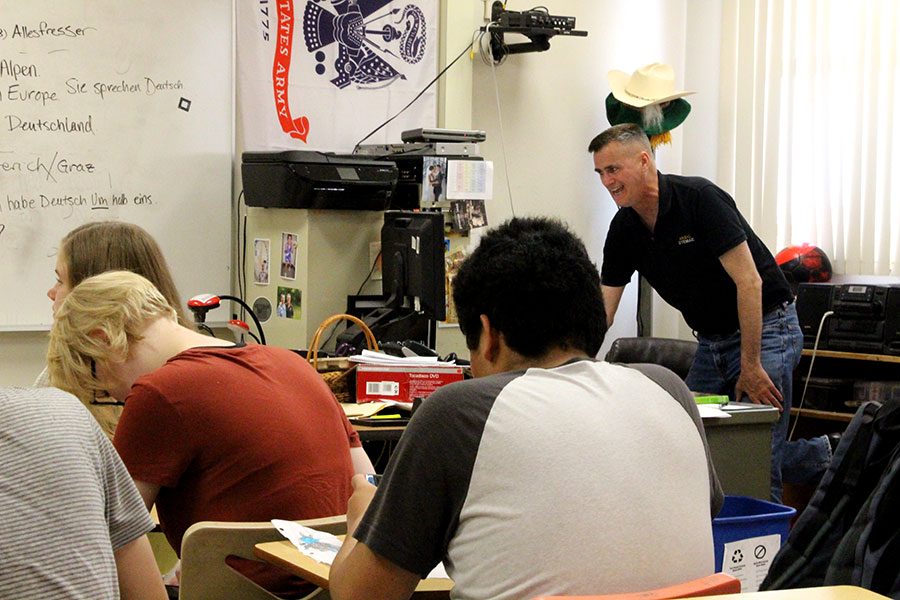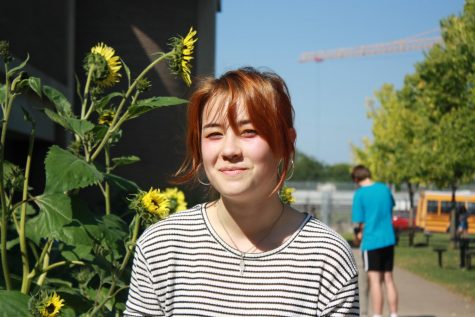Does it matter if your world language teacher is a native speaker?
Arthur French teaches his seventh hour German world language class even as a non-native German speaker. Supporting South High Chinese teacher, Dingman Yu’s statement “I think both have their advantages in having a non-native speaking teacher and a native speaking teacher.”
June 20, 2017
Languages are very important. They allow people to communicate with one another which can lead to new advancements, knowledge, and understanding of the people we share this world with.
There are roughly 3,000 to 8,000 languages around the world, depending on linguist determining what makes a language separate from another. That means that there are 3,000 to 8,000 languages to learn. South High school is the only school in Minneapolis where students can choose to learn eight of the world languages. South High provides the opportunity to learn Arabic, Chinese, French, German, Latin, Ojibwe, Somali, and Spanish.
I have taken many language classes. From what I have observed in these language classes, is that world language teachers get mocked most for being native speakers or non-native speakers. Which brought me to the question, does it matter whether a world language teacher is a native speaker or a non-native speaker?
Native speaking teachers are teachers that were born into the language that they teach. Non-native speaking teachers are teachers that weren’t born into the language that they teach but instead learned the language as secondary.
Dingman Yu is a native Chinese speaking teacher at South High. Yu was born in China and taught Chinese there at various levels for a few years before he moved to the United States. He then heard of a job opening as a Chinese world language teacher and decided to apply. He got the job and became the only Chinese teacher in the Minneapolis school district for quite some time until the district started to add similar programs.
Yu thinks that “Being a native speaker in teaching world language is not that important.” He elaborates with “[Native] speakers of language do come with the ideologies of having a greater command of the language, and might have a deeper understanding of the cultural phenomenons. Whereas I think English speaking teaching staff here, since most of them were educated here, most of them were familiar with the methodology and how to work with our students more efficiently. They understand the culture of the community better, so they can do a better job at integrating the learning culture of a specific school community with the language they are trying to teach.”
Arthur French is a non-native German speaking teacher at South High however he defines himself as being multicultural. When French was in high school his world language classes was what he looked forward to most. He continued his love to learn languages as he went into the military. Then to Japan where he met his wife, who is a native speaking Japanese teacher, and lived there for four years. He continued his passion all the way back to the United States where he started to teach world language. French can now speak five languages, German, Spanish, French, Japanese, and English.
Like Yu, French believes that both native speaking teachers and non-native speaking teachers have their advantages and disadvantages. He explained how not all native speakers can become teachers. In order to be a teacher you need a certain education to teach. Not everyone can be a teacher, because of this, all teachers, native speakers or not, are equal. Just as Yu said, the main difference seems to be the cultural differences. French uses his multicultural knowledge to connect his diverse German world language classroom by connecting German to other cultures.
Connecting cultures is a method that is used in Yu’s classes as well. As far as learning methods go, French explained how all the world language teachers meet to discuss how to teach. Each teacher may have a slightly different style to address their language they teach, but for the most part all methods are very similar.
Rachel Olivarez and Audrey Janz are freshman at South High, and they both have attended multiple world language classes. Olivarez has noticed that some students stereotype the teachers, for example “Not all non-native speakers have accents which makes they seem as though they don’t fully understand the language. Whereas teachers that are native seem to be more educated because they look and sound the part.”
Both Olivarez and Janz agreed that native speakers would be more helpful in understanding what life is like in the places that language is used and how you should use the language in those places. They also agreed on how non-native speakers may “relate to you”, as Janz puts it. Olivarez adds that “If you’re trying to teach someone about your culture it’s kind of hard to feed all of that information into one person’s brain. They’re probably not going accept it. They’re probably not going to understand it, because you [the native speaker] grew up with it and they did not.”
So, does it matter whether a world language teacher is a native speaker or a non-native speaker? Apparently not. There may be differences between native speaking teachers and non-native speaking teachers, but at the end of the day they are both teachers. Yu says that he encourages his students to “Have the initial interest, to know what is on [the] harrison, to know what their future can become if they keep working.” Like all teachers they just want to see their students succeed.






